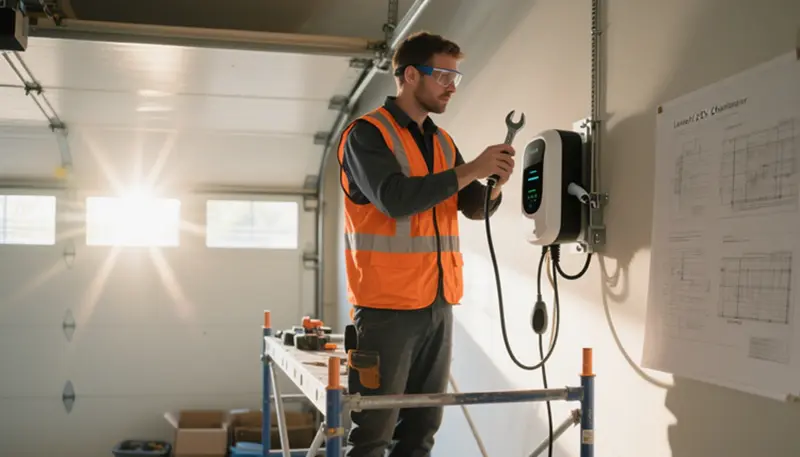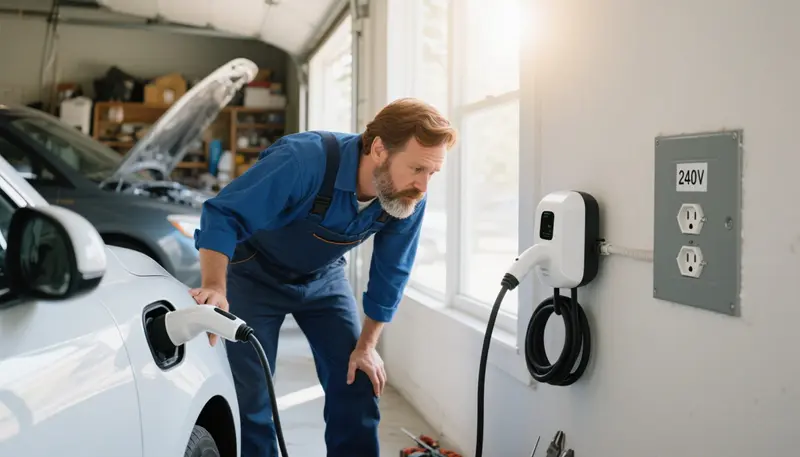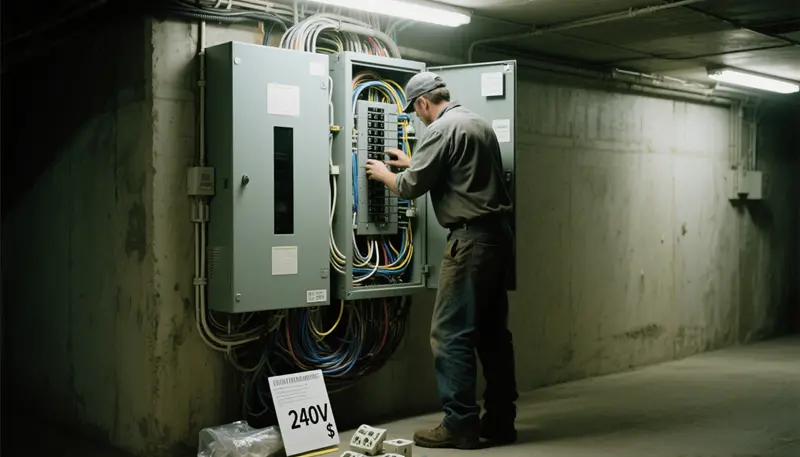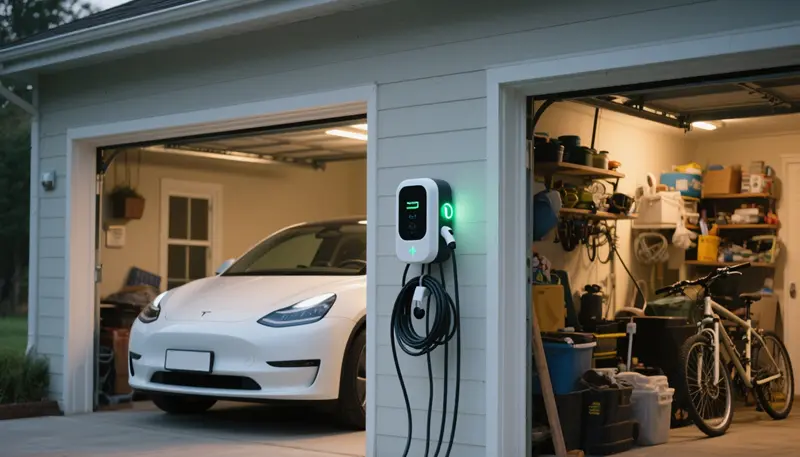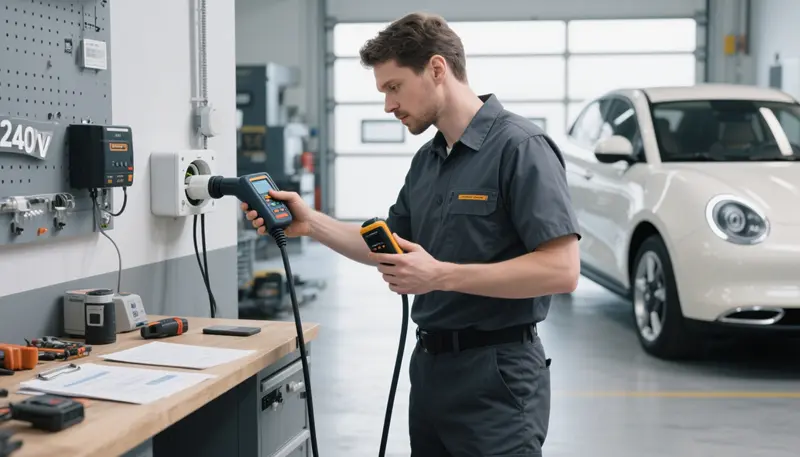Blog
Level 2 EV Charger: Your Ultimate Guide to Home EV Charging
Introduction to Level 2 EV Chargers
As electric vehicles (EVs) transform transportation in the U.S. and Europe, home charging has become essential for EV owners seeking convenience and savings. The Level 2 EV charger stands out as the most efficient home charging solution, offering faster speeds than Level 1 chargers and greater reliability than public stations. But what is a Level 2 EV charger? How much is a Level 2 charger? And how do you select the best home EV charger for your lifestyle? This in-depth 15,000+ word guide addresses these questions, providing a comprehensive resource on Level 2 EV charging stations, installation costs, top models, and more.
Whether you drive a Tesla, a Nissan Leaf, or are planning your first EV purchase, this article covers everything from home EV charging stations to dual electric car chargers, empowering you to make informed decisions. We’ll explore what is the cheapest and best Level 2 charger, Level 2 charger cable options, and how to safely install a Level 2 EVSE charger. Let’s dive into the world of Level 2 EV chargers and optimize your home charging experience.
What Is a Level 2 EV Charger?
Defining Level 2 EV Chargers
A Level 2 EV charger is a home or commercial charging device that operates on a 240V electrical circuit, delivering 7.2-11.5 kW of power. Compared to Level 1 chargers, which use 120V outlets and add 3-5 miles of range per hour, Level 2 chargers provide 20-50 miles of range per hour, making them ideal for daily EV charging. The term Level 2 EVSE charger refers to the Electric Vehicle Supply Equipment (EVSE), the hardware that safely transfers power to your EV.
Key Characteristics
- Voltage and Amperage: Runs on 240V with 16-50 amps, depending on the model and circuit.
- Connectors: Uses J1772 plugs (standard for most EVs) or Tesla’s proprietary connector (with J1772 adapters).
- Charging Speed: Outputs 7.2 kW (30 amps) to 11.5 kW (50 amps), fully charging a 60 kWh battery in 4-8 hours.
- Installation: Requires a dedicated 240V circuit, typically a NEMA 14-50 outlet or hardwired setup.
Level 2 vs. Level 1 Chargers
To clarify the differences:
- Level 1 Charger (120V, 12-16 amps):
- Plugs into standard outlets (e.g., NEMA 5-15).
- Delivers 3-5 miles/hour, suitable for plug-in hybrids or low-mileage EVs.
- Often included as a Level 1 electric car charger with EVs.
- Level 2 Charger (240V, 16-50 amps):
- Requires professional installation and a 240V circuit.
- Adds 20-50 miles/hour, ideal for pure EVs like Tesla Model Y or Ford Mustang Mach-E.
- Includes smart features in best Level 2 EV chargers (e.g., Wi-Fi, scheduling).
The Level 2 EV charger is the go-to choice for most EV owners due to its speed and versatility.
Advantages of a Level 2 EV Charger
Why Opt for a Level 2 Charger Over a Level 1 Charger?
The Level 2 charger offers compelling benefits, making it a smart investment for EV owners. Here’s why it’s preferred:
- Rapid Charging:
- A Level 2 EV charging station charges 5-10 times faster than a Level 1 EVSE charger, minimizing wait times.
- Example: A Nissan Leaf (40 kWh) charges in 4-6 hours with a Level 2 charger vs. 20-24 hours with a Level 1 charger.
- Cost Savings:
- Charging during off-peak rates ($0.10-$0.20/kWh) saves $100-$500/year compared to public chargers ($0.30-$0.50/kWh).
- Level 2 chargers optimize energy efficiency, reducing long-term costs.
- Universal Compatibility:
- Supports all EVs with J1772 or Tesla connectors (via adapters), including the best electric vehicle charger models. (e.g.,👉FlagTools 22KW EV Charger).
- Pairs with Level 2 charger cables (5-7.5 meters) for flexible garage or driveway setups.
- Convenience:
- Eliminates dependence on public stations, perfect for daily commutes or road trips.
- Smart Level 2 EV chargers offer app-based scheduling and remote monitoring.
- Increased Property Value:
- Installing a home EV charging station boosts home resale value by 1-3% in EV markets like California or Norway.
- Attracts buyers seeking the best home EV charging stations.
- Battery Longevity:
- Level 2 chargers deliver gentler charging than DC fast chargers, extending battery life by 5-10 years.
The Level 2 EV charger combines speed, savings, and practicality, making it essential for home EV charging stations.
How to Choose the Best Level 2 Home EV Charger?
What Is the Cheapest and Best Level 2 Charger?
Finding the best home Level 2 charger requires balancing cost, features, and EV compatibility. Here’s a detailed guide to selecting the best Level 2 EV charger:
Key Selection Criteria
- Power Output:
- Opt for 7.2 kW (30 amps) for standard EVs or 11.5 kW (50 amps) for high-capacity models (e.g., Rivian R1S).
- Confirm your panel supports the amperage to avoid upgrades.
- Smart Features:
- Wi-Fi: Enables remote control, scheduling, and energy tracking (e.g.,👉FlagTools 22KW EV Charger).
- Load Balancing: Manages power for dual electric car chargers in multi-EV homes.
- App Support: Monitors costs and optimizes off-peak charging.
- Cable Length:
- Standard Level 2 charger cables are 5-7.5 meters, adequate for most setups.
- Extended cables (10 meters) cost $50-$100 for added reach.
- Installation Options:
- Plug-In: Connects to a NEMA 14-50 or 6-50 outlet, portable and easier to install.
- Hardwired: Permanent setup, often required for outdoor or high-amperage chargers.
- EV Compatibility:
- J1772 connectors (Type 1) fit most EVs; Tesla requires adapters or Tesla-specific chargers.
- Check your EV’s max charging rate (e.g., Ford Mustang Mach-E accepts 7.6 kW).
- Price Range:
- How much is a Level 2 charger? Costs range from $300-$1,200.
- Best Value: FlagTools EV Charger Series ($300-$500).
- Mid-range: Wallbox Pulsar Plus ($500-$700).
- Premium: ChargePoint Home Flex ($700-$1,000).
Recommended Level 2 Chargers
- ChargePoint Home Flex ($1,000):
- Wi-Fi, Alexa integration.
- Best home EV charger for tech-savvy users.
- Tesla Wall Connector ($1,500):
- Tesla-optimized with J1772 adapter, supports dual electric car charger load sharing.
- Best Level 2 charger for Tesla owners.
- FlagTools EV Charger Series (Under $500):
- Choose 7KW/11KW/22KW for home or commercial use, tailored to your voltage needs.
- CE/UL-certified for EU/NA markets.
- Smart Charging Management, Wi-Fi, energy monitoring, and adjustable amperage.
- Durable Level 2 charger cable, IP65 protection Level, TPU jacket (-30°C to +50°C resistant).
- Equipped with Type 1 (SAE J1) | Type 2 (IEC) charging connector.
- Affordable best home Level 2 charger.
Installation Process and Costs for Level 2 EV Chargers
How Much Does It Cost to Install a Level 2 EV Charging Station?
Installing a Level 2 EV charger involves professional electrical work and potential upgrades. Here’s a step-by-step guide and cost breakdown for cost to install a Level 2 EV charger:
Installation Steps
- Electrical Evaluation:
- A licensed electrician assesses panel capacity (100-200 amps) and load requirements.
- A 40-50 amp circuit is typical for Level 2 EV charging stations.
- Select Installation Location:
- Garage: Preferred for panel proximity, reducing 240V outlet installation costs.
- Outdoor: Needs weatherproofing (e.g., NEMA 3R enclosure, $50-$100).
- Place near the EV’s charging port for Level 2 charger cable reach.
- Hire a Licensed Electrician:
- Electricians charge $50-$150/hour (U.S.) or €40-€100/hour (Europe) for electrician install Level 2 charger.
- Tasks include wiring (6 AWG copper), breaker installation, and charger mounting.
- Secure Permits:
- Permits ($50-$200) are required in most areas to comply with NEC Article 625 or IEC 61851.
- Electricians manage permit applications and inspections.
- Install the Charger:
- Plug-In: Uses a NEMA 14-50 or 6-50 outlet ($10-$50).
- Hardwired: Direct panel connection for permanent setups.
- Installation takes 4-8 hours, based on wiring complexity.
- Test and Finalize:
- Verify the Level 2 EV charger delivers 240V and communicates with the EV.
- Use cable organizers for Level 2 charger cables to maintain a tidy setup.
- Keep permit records for insurance or warranty purposes.
Cost Breakdown
- Charger Cost:
- How much is a Level 2 charger? $300-$1,200.
- Dual electric car chargers: $1,000-$2,000.
- Equipment Costs:
- Outlet (plug-in): $10-$50.
- Wiring and conduit: $50-$200 (10-50 feet).
- Breaker (40-50 amps): $20-$50.
- Labor Costs:
- Electrician fees: $300-$1,500 (4-8 hours at $50-$150/hour).
- Urban rates (e.g., New York: $100-$150/hour) exceed rural ($50-$80/hour).
- Electrical Upgrades:
- Panel Upgrade: $1,000-$3,000 (100 to 200 amps).
- Subpanel: $500-$1,500 for distant setups.
- Service Upgrade: $2,000-$5,000 (rare).
- Permits and Inspections:
- Permits: $50-$200.
- Inspections: $50-$150.
Total Cost Range:
- Simple Setup: $800-$1,500 (plug-in near panel).
- Average Setup: $1,500-$2,500 (moderate wiring, hardwired).
- Complex Setup: $2,500-$5,000 (upgrades, long runs).
Regional Cost Variations
- U.S.: Cost to install a Level 2 EV charger averages $1,500-$2,500 in urban areas and $800-$1,500 in rural regions.
- Europe: €1,000-€3,000, with Germany (€1,500-€3,500) higher than Eastern Europe (€800-€2,000).
Proper planning minimizes cost to install a Level 2 EV charger.
Level 2 Charger vs. Level 1 Charger: In-Depth Comparison
Should I Choose a Level 1 EVSE Charger or a Level 2 EVSE Charger?
Comparing Level 1 EV charger and Level 2 EV charger helps determine the best fit:
Charging Speed
- Level 1 Charger:
- 120V, 12-16 amps, 1.4-1.9 kW.
- Adds 3-5 miles/hour (e.g., 36-60 miles in 12 hours).
- Suits plug-in hybrids or short commutes (<20 miles/day).
- Level 2 Charger:
- 240V, 16-50 amps, 7.2-11.5 kW.
- Adds 20-50 miles/hour (e.g., 240-600 miles in 12 hours).
- Ideal for pure EVs with longer commutes (>50 miles/day).
Installation Needs
- Level 1 EV Charger:
- Uses existing 120V outlets, no installation needed.
- Portable, included as a Level 1 electric car charger.
- No permits unless adding outlets.
- Level 2 EV Charger:
- Requires a 240V circuit and electrician install.
- May need panel upgrades ($1,000-$3,000) or permits ($50-$200).
- Fixed setup for Level 2 EVSE charger in garages or driveways.
Cost Analysis
| Category | Level 1 Charger | Level 2 Charger |
|---|---|---|
| Charger Cost | $100-$300 (often included) | $300-$1,200 |
| Installation Cost | $0-$500 (new outlet) | $500-$3,500 |
| Total Upfront | $100-$500 | $800-$5,000 |
| Charging Cost (kWh) | $0.10-$0.30/kWh | $0.10-$0.30/kWh |
| Annual Savings | Lower (public charging) | $100-$500/year |
Ideal Use Cases
- Level 1 EVSE Charger:
- Budget-conscious renters or low-mileage drivers (e.g., Toyota Prius PHEV).
- Level 2 EVSE Charger:
- High-mileage EV owners or multi-EV households (e.g., Tesla Model 3).
The Level 2 EV charger is superior for most EV owners, offering speed and efficiency.
Special Scenarios: Dual Electric Car Chargers
Can I Use a Dual Electric Car Charger for Multiple EVs?
For multi-EV households or shared spaces (e.g., apartments), dual electric car chargers are efficient. Here’s an overview:
Advantages
- Compact Design: One unit serves two EVs, saving space vs. two Level 2 EV chargers.
- Power Sharing: Splits amperage (e.g., 40 amps as 20 amps per EV), avoiding overloads.
- Cost Savings: Single installation ($1,500-$3,500) vs. two setups ($2,000-$5,000).
Recommended Models
- ChargePoint Home Flex Dual ($1,500):
- Wi-Fi, load balancing, and app control.
- Best home EV charging station for multi-EV homes.
- Tesla Wall Connector (Shared) ($1,200):
- Supports up to four chargers with power sharing.
- Top dual electric car charger for Tesla owners.
- EVBox BusinessLine Dual (€2,000):
- Smart load management for residential or commercial use.
- Leading best Level 2 charging station in Europe.
Installation Notes
- Circuit Requirements: Needs a 50-80 amp circuit, possibly requiring a panel upgrade ($1,000-$3,000).
- Location: Central placement in garages or parking areas for Level 2 charger cable access.
- Permits: Higher amperage increases permit costs ($100-$300).
- Cost: Cost to install a Level 2 EV charger for dual units: $1,500-$3,500.
Applications
- Multi-EV Homes: A family with a Nissan Leaf and Tesla Model Y uses a dual electric car charger.
- Apartments: Property managers install best home EV charging stations for tenants.
- Offices: Businesses provide Level 2 charging stations for employees.
Dual electric car chargers future-proof multi-EV setups.
Saving on Level 2 Charger Costs
How Can I Reduce the Cost of a Level 2 Charger?
Lowering cost to install a Level 2 EV charger and operating expenses is possible with these tips:
Installation Savings
- Incentives:
- U.S.: 30% federal tax credit (up to $1,000) for Level 2 EV charger (valid through 2032).
- State/Utility Rebates: California ($500-$1,000), New York ($300-$500), PG&E ($200-$500).
- Europe: UK (£350), Germany (€900), Norway (tax exemptions).
- Location Strategy:
- Install in a garage near panel to save $500-$1,000 on wiring.
- Avoid outdoor setups requiring weatherproofing.
- Electrician Quotes:
- Compare 3-5 quotes for electrician install Level 2 charger ($300-$1,500).
- Use Angi or HomeAdvisor for certified professionals.
- Budget Chargers:
- Choose affordable best Level 2 chargers like FlagTools EV Charger Series($300-$500).
- Opt for plug-in models to save $100-$300.
Operating Savings
- Off-Peak Rates:
- Schedule charging at $0.10-$0.20/kWh (midnight-6 AM) with smart Level 2 EV chargers.
- Saves $100-$300/year vs. peak rates.
- Solar Power:
- Pair Level 2 charging stations with solar panels ($10,000-$20,000) for $0.05-$0.10/kWh.
- Long-term savings offset initial costs.
- Energy Tracking:
- Use apps in best home EV chargers to monitor usage and avoid overcharging.
- Maintenance:
- Inspect Level 2 charger cables every 6-12 months ($0-$50/year).
These strategies reduce cost to install a Level 2 EV charger and ongoing costs.
Frequently Asked Questions (FAQ)
Q: How much is a Level 2 charger?
A: A Level 2 charger costs $300-$1,200, with budget options like FlagTools EV Charger Series($300-$500) and premium models like ChargePoint ($700-$1,000).
Q: What’s the best Level 2 EV charger?
A: Top picks include:
- ChargePoint Home Flex: Smart features ($1,000).
- Tesla Wall Connector: Tesla-optimized ($1,500).
- FlagTools EV Charger: Cheapest and best Level 2 charger (Under $500).
Q: How much does it cost to install a Level 2 EV charger?
A: Cost to install a Level 2 EV charger ranges from $800-$2,500, covering equipment ($300-$1,200), labor ($300-$1,500), and permits ($50-$200).
Q: Can a Level 2 charger work with a Level 1 EVSE charger?
A: Level 2 EV chargers require 240V circuits, while Level 1 EVSE chargers use 120V. Adapters may work, but speed is limited.
Q: What’s the best home Level 2 charger for Tesla?
A: The Tesla Wall Connector ($600, 48 amps) is the best home Level 2 charger for Tesla, with load-sharing for dual electric car chargers.
Q: Do I need a permit for a Level 2 EV charger?
A: Yes, permits ($50-$200) are required for Level 2 EV charger installations to meet NEC or IEC standards.
Q: How long is a Level 2 charger cable?
A: Level 2 charger cables are typically 5-7.5 meters; extended cables (10 meters) cost $50-$100.
Conclusion: Embrace Level 2 EV Charging
The Level 2 EV charger is the ultimate solution for fast, reliable, and cost-effective home EV charging. With 5-10 times the speed of Level 1 chargers, universal EV compatibility, and smart features, Level 2 EV charging stations are essential for modern EV owners. Whether you choose the Level 2 EV charger like ChargePoint, the cheapest and best Level 2 charger like FlagTools EV Charger Series, or a dual electric car charger, this guide equips you with the knowledge to succeed.
With installation costs of $800-$2,500 and incentives reducing cost to install a Level 2 EV charger, now is the time to invest in a home EV charging station. Select the best home Level 2 charger and partner with a licensed electrician to enjoy seamless charging.


